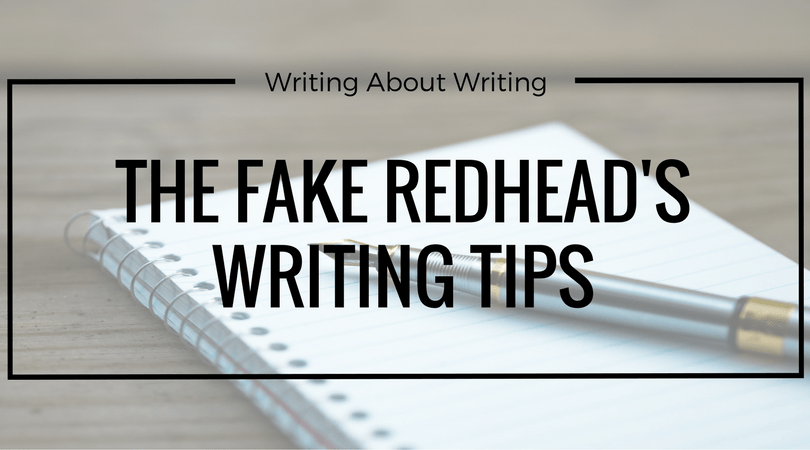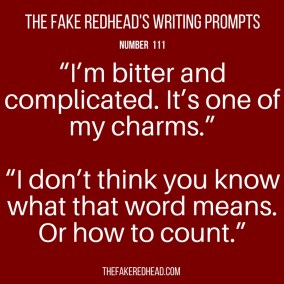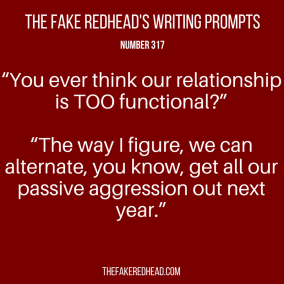Writing Tips | Find Your Next Favorite Book | Prompt Library | Shop The eBooks
So, you want to write a novel
But where in the world are you supposed to start?
Things in life aren’t easy, and writing a novel is one of the hardest things you can do. I may put words together into sentences that lead to entertaining plots as easily as I breathe, but finishing the #WhoIsTalyaNightingale manuscript was one of the most difficult things I’ve ever done.
And it’s not even the first full, start-to-finish story I’ve ever written.
That was actually my freshman year of college and while the likelihood that it’ll ever see the light of day is slim, it’s still pretty damn awesome.
But the act of sitting down and writing and starting something and actually finishing it?
Terrifying.
Hell, leaving my career in college athletics PR was a thousand time LESS terrifying.
A caveat though: if you let yourself think about it too much, THEN it’s terrifying.
But if you don’t think about it? All bets are off, and you get a novel in the end.
Three weeks ago (has it really been that long? Time is weird), I wrote about 5 Ways To Start Your Story, and this piece is less about WHAT you’re doing to write and more about the way to get the words rattling around your brain on paper (or, let’s be real, into a Word Document or other computer-based equivalent).
That blank document, clean slate, what have you, may seem incredibly intimidating, but it doesn’t have to be, and it doesn’t have to stay blank forever.
So click the Continue Reading button for five tips for writing (and finishing!) your novel.
1 Don’t Think About What You’re Doing
Seriously.
Don’t do it.
But Kathryn, you find yourself saying to your computer screen, laptop, iPhone, or whatever you’re reading this post on, if I’m not thinking about writing my novel, doesn’t that defeat the entire purpose OF writing my novel?
No.
Let me explain.
As I’ve been saying, writing a novel is an incredibly daunting task, but the last think you should think about is just HOW daunting it is.
Do it now, while you’re reading this post, so when you’re actually writing your story, you take my advice from the start.
Don’t think about the thousands of words you have to write, don’t think about the fact that you’re probably staring at a blank document, don’t think about the fact that you don’t have most of your characters fleshed out, or even that you don’t know how to get your protagonist from Point A to Point B.
You have so much that you’re going to fill in to the between 80,000 to 90,000 words you’re going to write (generalities. Don’t think about word counts either, just write your story and the rest will work itself out), you just need to get it out of your head
That’s literally it.
All you have to do is get it out of your head.
Easier said than done, right?
Just do it.
It won’t be perfect when you start, but as long as you get your point across on paper, you’ll be able to make it great.
2 Don’t Start From The Beginning (If You Don’t Want To)
I think that a part (one of many) of why people are so apprehensive about writing a novel is that they think that there’s some rule where you have to write the beginning, followed by the middle, and then the end.
Not true.
And, in my case, not possible.
In the past, I’ve tried to write in order, you know, Chapter Beginning to Chapter Ending…but my brain doesn’t work that way.
I’ve also tried to write something that is constrained to one story that doesn’t have a sequel or two sequels or five sequels and two prequels and five-books worth of spin-off, but—
Well, that didn’t work either.
You have to figure out what works for you and throw the rest of the rules out the window. There are no rules when it comes to writing. Even my posts aren’t rules. They’re tips. Advice. Guidelines.
Remember what Captain Barbossa said in Pirates of the Caribbean about the Pirate Code, “And thirdly, the code is more what you’d call ‘guidelines’ than actual rules.”
See? Guidelines.
You do you.
So just write. It doesn’t have to be from the beginning. Put words to paper and go!”
When I wrote that first story, that one in college, I started it all by writing an argument between two characters. They didn’t have names, I didn’t know WHAT they were arguing about other than a vague idea that someone had made a very bad decision, but I wrote it.
Seven months later, I finished that story.
So it’s totally possible. If I can do it, you can definitely do it.
3 Write Then Ending When You Think Of One
Going along with not starting at the beginning, writing your ending whenever you think of one puts you at a HUGE advantage.
That’s not to say that not having your ending puts you at a DISadvantage, but it definitely helps.
Why does it help?
Because when you have your ending write, you have officially given yourself a concrete finish line.
Your goal now that you’ve written your ending is to write all the scenes you need in order to connect the beginning and middle to it.
In fact, that’s how I treat looking for books I want to read for fun. When I was in high school and had both the time and disposable income to surround myself with books, I discovered that the best way for ME to figure out if I’d like a story was to A) read the back of the book and see if the plot was something I’d like to read, and then B) flip through the last few pages to see if I’d like where the ending has gone.
Because here’s the thing: when I’m reading a book, I’m less interested in how it ends as I am the JOURNEY that the characters take to get from the first chapter to the last.
I don’t care about spoilers, I want to see how it’s all executed.
But back to my point, if you think of the way to end your story when you’re only two scenes in, don’t stop yourself from writing it.
Don’t wait.
Yes, what you write on Monday might make the scene not work by Friday, but the LAST thing you want to do is forget what you wanted to do, or worse, DELETE something that you think won’t matter, only to realize weeks or months later that you could have used a part of all of that text somewhere else.
I accidentally deleted the first 5,000 words of the very, very, very, very first draft of the #WhoIsTalyaNightingale story, and while the way the story was originally written is NOTHING like the finished product, deleting ANY of what I wrote, accident or not, was still a gut punch.
So don’t do that.
Keep everything. You never know what you’re going to end up using.
4 ALWAYS Make Sure You Can Take Notes
Always, always, ALWAYS make sure that you have at least some way to take notes or not down story ideas when they come to you, especially when you’re away from your computer or whatever thing houses your manuscript.
Don’t depend on your memory.
Even I, who very rarely forgets things (except when I want to because reasons), I about eight different note documents that are all related to the #WhoIsTalyaNightingale universe.
I have a LOT of ideas.
It doesn’t even count my note about the groceries I need to pick up, or future story plots, characters that don’t fit into any universe I’ve created so far, or the document where I house all my original writing prompts*.
But also, whenever you think of a good piece of dialogue, or a scene, or a crucial plot point, or something that can fill a gaping plot hole, or an idea to take a character from a one-line one-off to the most important person in the latter half of your story or series, then you’re DEFINITELY going to want to be able to write things down.
And you can go analog too.
When I was in high school, pre-iPhone Notes app, I carried a spiral notebook EVERYWHERE.
I still have a bunch of them, and it’s cool to be able to go back into those things and see all the old stuff used to write back in the day. Also, I can see that I had TERRIBLE handwriting back then and it hasn’t gotten any better.
5 Need Some Structure? Try Something Like NaNoWriMo
Though I’ve only done it once, I’m a big fan of NaNoWriMo.
In fact, WITHOUT NaNoWriMo, I don’t know if I would have finished the first half of the #WhoIsTalyaNightingale manuscript back in 2015.
Sure, that’s the draft that had a bunch of scenes missing, including a lot of this:
AND THEN FIGHT HAPPENS. INSERT EVENTUALLY
But with NaNoWriMo, I was able to do something I hadn’t done since college: I actually finished a story.
It was a tall task, especially since November is by far one of the busiest months back in my old job, and it stands to reason that juggling all of that is why I don’t remember most of what happened that month. I do remember a weekend trip to Illinois tough. That did happen.
And while I didn’t start with a completely fresh document during the 2015 go-around, I did start from the beginning, took what I wrote so far and fleshed out the beginning, tightened up the middle, and figured out what to do with the end, even if I hadn’t completely gotten to that point yet.
That’s also when I took what I had and lopped off about 20,000 words to turn into a part-two-esque sequel.
I was also able to use the daily check-ins and word-count milestones to keep my motivation and reach that hallmark of 50,000 words and beyond.
And hey, does November not work for you? NaNoWriMo hosts similar writing months in April and July, and you can also set your own monthly writing goals and…just write.
Just write anyway.
Go, do it.
Check Out The Last Writing Tip Check Out The Next Writing Tip
Shop The eBooks | Find Your Next Favorite Book
Want more prompts? Check out the Prompt Library.
*A three-week series on how to use those to make your writing awesome coming…soon. Maybe in a week or two. I’m working on it.
Do you have a question about writing that you want me to answer? Leave a comment below! (I’m also answering questions in the Facebook group. Hop on over and say hi!)







Okay, so this is an old blog post, but I love it. These are great suggestions for new writers and great reminders for more experienced writers. Also the tone you write with is hilarious. Okay that’s all! -Beth